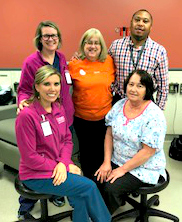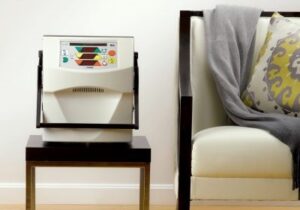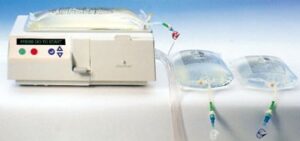
Washington University/Barnes-Jewish Hospital is proud to have one of the nation’s largest home dialysis programs.
Home dialysis is offered to patients with renal failure as an alternative to in-center dialysis. Home modalities include peritoneal dialysis (PD) and home hemodialysis (HHD). These home-based modalities help patients enjoy a better quality of life. It gives them flexibility and control over their lives. A big advantage is that patients are able to travel and continue their treatments while away from home. As well, a high percentage of patients remain employed. Studies have shown that home hemodialysis and peritoneal dialysis have better clinical outcomes and lower hospitalization and infection rates compared to in-center dialysis.
Treatments are performed in the comfort of a patient’s home. In addition, there are fewer dietary restrictions. It is well known that blood pressure and phosphorous may be better controlled, requiring fewer medications. Patients notice increased energy, improved appetite and better sleep. Home dialysis is considered to be gentler on the body and there are fewer “rules” (for example, patients can have visitors and eat during dialysis).

Our team of dedicated specialists provide convenient in-home training for peritoneal dialysis, and in-clinic training for hemodialysis. Because a diagnosis of kidney disease can be challenging, our training focuses on helping both the patient and the patient’s family through this life transition.
Even though treatment takes place at home, patients know they are never alone. Our healthcare team provides expert follow-up care using a remote monitoring system and the availability of a nurse on call 24 hours a day, 7 days a week, to answer questions. Technical support for dialysis equipment is available and dialysis supplies are delivered to the home.
Patients see their physicians once a month at one of our four local clinics, conveniently located throughout the St. Louis area.

Transitional Dialysis Program
ESKD patients and their families experience increased stress during the first few weeks of dialysis, likely related to the trauma of dialysis initiation along with unexpected lifestyle changes.
A lack of patient education about kidney disease and available treatment options – in particular, home dialysis – remains the biggest barrier to improving outcomes.
Informing and educating patients about the option for home dialysis modalities is our top priority.
Manasa Metireddy, MD, Assistant Professor of Medicine, Division of Nephrology, and Medical Director of Home Modalities is head of our Transitional Dialysis Program.
“The goal of the Transitional Dialysis Program is to make transition to home dialysis seamless for our patients. A dedicated multidisciplinary team of experienced physicians, highly skilled nurse coordinators, medical staff, social worker and nutritionist are here to assist patients who choose this option.
Our program enables PD patients to receive training within the comfort of their homes. We also utilize the latest technology for monitoring their home treatments. We hope to expand home dialysis such that it is easily accessible to each and every patient in need of dialysis.
We take pride in being one of the largest academic home dialysis programs. Our nephrology fellows see a high volume of PD and HHD patients and gain tremendous experience in the day-to-day management of home dialysis patients.
We also have a comprehensive home modality educational curriculum with specific learning objectives to complement their clinical training.
In addition to a monthly home dialysis clinic, fellows have the opportunity to participate in home modality clinics as part of their electives for in-depth learning.”
Manasa Metireddy, MD, head of Transitional Dialysis Program
With new changes being proposed, it is expected that home dialysis practices will grow considerably throughout the country. Our program ensures that our graduating fellows are highly trained in this field and fully prepared to take on any challenges in practice.
See the Home Modalities Curriculum for our fellows »
Home Hemodialysis
Advances in dialysis technologies have highly simplified hemodialysis, allowing it to be performed in the comfort of a patient’s home. A smaller dialysis machine that fits on a nightstand and simpler blood tubing and dialyzer connections have resulted in more patients choosing this dialysis modality. This form of dialysis can be tailored to an individual’s needs, thus preserving one’s independence. Dialysis can be performed during a short daily hemodialysis session or during a longer session at night, which is called nocturnal hemodialysis.

Additional advantages of home hemodialysis:
– Allows a much higher clearance of blood toxins compared to other forms of dialysis
– Allows better phosphorous control, requiring less use of phosphate binders
– Gentle fluid removal
Peritoneal Dialysis
Peritoneal dialysis is one of the simplest forms of dialysis and has the least amount of interruption in an individual’s lifestyle. This type of dialysis filters a patient’s blood naturally, using the lining of the abdomen, the peritoneum, to cleanse the blood and remove excess fluids. The procedure can be tailored to individual needs. The simplicity of peritoneal dialysis makes it a popular modality for patients who need a high degree of freedom in their busy lifestyles.

Additional advantages of peritoneal dialysis
– Simple to perform
– Easier for those who travel or work
– Fewer dietary potassium restrictions
– Does not require cannulation, no blood involved

Interested in our home dialysis modalities?
Contact us at: 314-286-0874 or visit our Kidney Resource Center.
Watch the 2019 ASN TV video highlighting our Home Modalities Program:
Home Hemodialysis and Peritoneal Dialysis Clinic and Training Locations
Forest Park Kidney Center – Home Modalities
4205 Forest Park Avenue
St. Louis, MO 63108

North County Dialysis Center
272 Mayfair Plazsa Shopping Center
Florissant, MO 63033

Home Dialysis South
5201 MidAmerica Plaza
St. Louis, MO 63129

Barnes-Jewish West County Hospital
(Clinic only)
10 Barnes West Drive
12634 Olive Blvd
Creve Coeur, MO 63141
